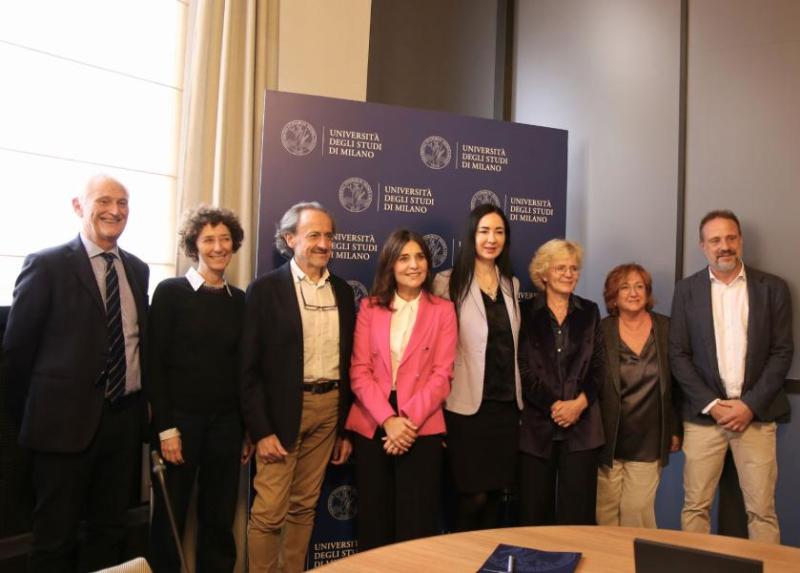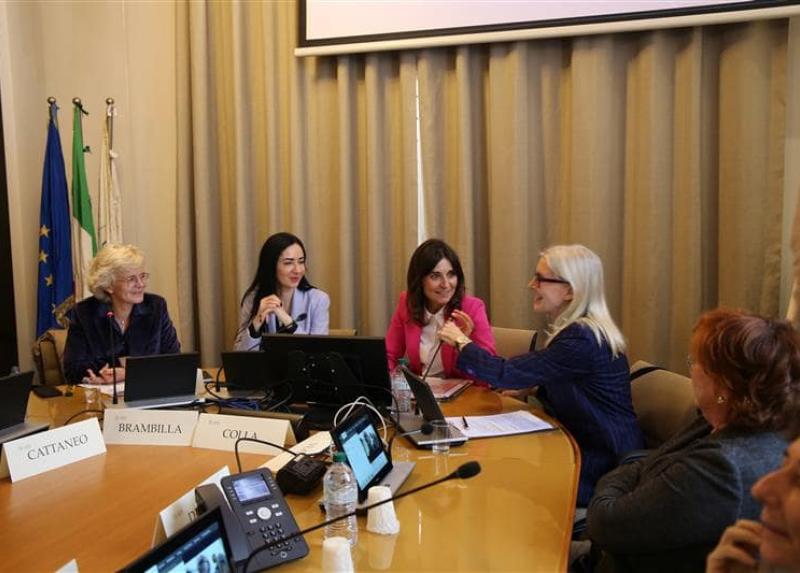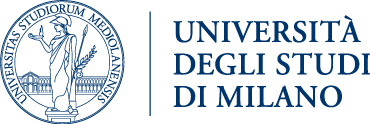
Rector Marina Brambilla, Vice Rector for Research, Monica Diluca, the five scientists and the Representative of the European Commission for Northern Italy, Claudia Colla
The University of Milan has been awarded its fifth Synergy Grant by the European Research Council (ERC), for a project which, in the next few years, aims to revolutionise the field of stem cell therapies for neurodegenerative diseases by developing innovative and personalised cellular products capable of responding to the different therapeutic needs of patients.
The grant was won by a research team led by Elena Cattaneo, professor of Pharmacology at the University of Milan, life senator and director of the Laboratory of Stem Cell Biology and Pharmacology of Neurodegenerative Diseases (Department of Biosciences of the University of Milan & National Institute of Molecular Genetics). The research project is titled "CUSTOM-MADE – Neurons for cell therapy in Parkinson's and Huntington's disease" and will be developed in collaborations with other three research teams, led respectively by Annalisa Buffo (Rita Levi-Montalcini Department of Neuroscience and NICO - Neuroscience Institute Cavalieri Ottolenghi of the University of Turin), Malin Parmar (Lund University, Sweden) and Jenny Emnéus (Technical University of Denmark).
ERC Synergy Grants are awarded to groups of scientists who join their forces to work on innovative projects, and it is precisely the collaboration between interdisciplinary research teams which enabled the University of Milan to win the grant, along with the perseverance of a close-knit academic community, able to prove competitive in the European arena. Teams who win an ERC Synergy Grant receive a total of 10 million euros over six years. This year, 56 out of 548 projects were selected for funding (10.5%).
CUSTOM-MADE aims to create and customise a portfolio of stem cell products for individual patients or groups of patients, particularly to treat Parkinson's and Huntington's disease. Integrating stem cell technology with genomics and bioengineering, and using pre-clinical trials, CUSTOM-MADE seeks to generate optimised neurons in vitro by combining diseased neurons with complementary cells, so as to use them in transplants in order to respond to the specific therapeutic needs of individual patients. These neurons would also be enhanced in their ability to restore lost circuits, improving functional recovery after the transplant. A particularly innovative aspect is the fact that researchers will use a fully humanised and bioengineered 3D in vitro system to create models of how neural circuits are formed and restored. This approach will allow researchers to investigate cellular and molecular factors regulating the normal functioning of human neurons, in a way that was never possible before.
CUSTOM-MADE neurons will be able to regulate and adjust their own activity to the needs of individual patients, while the cells produced will be equipped with mechanisms to protect them from Huntington's or Parkinson's, and at the same time slow down the disease progression in the diseased brain.
"The true challenge begins today", said Elena Cattaneo. "We have been trying to win this grant for two years. In 2023, the project was rejected, but we received very detailed feedback from the ERC on its strengths and weaknesses. This allowed us to work on the problematic aspects and resubmit the proposal one year later, which resulted in today's success. The Europe of research is strong, and allows us to work together, beyond borders and in the interest of citizens. We are unbelievably excited, because now we can investigate new and unprecedented solutions to treat Parkinson's and Huntington's disease, though we are also aware of the great responsibility that comes with this challenge. I am very proud to have climbed the same 'Everest of research' as my four colleagues who preceded me in winning an ERC Synergy Grant: this is a sign of the strength and competitiveness of our academic community, and more generally, of the strength and competitiveness of Italy's universities and public research system. Another thing that makes me proud is having achieved this result with a team of four women scientists".

A moment of the press conference
CUSTOM-MADE is the fifth project of the University of Milan to win an ERC Synergy Grant since its introduction in 2018. The other four winning projects were SOLID by Maurizio Ferrera in 2018, Nemesis by Marcello Massimini and SHAPINCELLFATE by Giorgio Scita in 2022, and NeuroSonoGene by Anna Moroni in 2023. To celebrate these five frontier research projects, the University of Milan held a press conference on 5 November, with Rector Marina Brambilla, Vice Rector for Research, Monica Diluca, the five scientists and the Representative of the European Commission for Northern Italy Claudia Colla.
Since 2010, the University of Milan has won 63 ERC grants (14 Advanced Grants, 19 Starting Grants, 15 Consolidator Grants, 5 Synergy Grants and 10 Proof of Concept Grants), for a total of over 65 million euros. Out of the 63 projects which were awarded an ERC grant, 30 are still in progress. More specifically, we are talking about 29 projects in the life sciences sector (13 of which are in progress), 20 projects in the area of physical sciences and engineering (10 in progress) and 14 projects in the social sciences and humanities (7 in progress).
Rector Marina Brambilla said: "If understood as an opportunity to shape the future, research must inevitably transcend national borders, and be open to the challenges that come our way from beyond these borders, from Europe and the whole world. Scientists must be enabled to make the most of the synergies between different sectors, to join forces and share resources and expertise. This is what the University of Milan can bring to the table: the added value of a large University, whose multidisciplinary character allows researchers to tackle the most challenging questions arising from today's complex reality."
"Congratulations to the University of Milan on winning its fifth ERC Synergy Grant, for a project on personalised stem cell therapies for treating Huntington's and Parkinson's disease", added Claudia Colla, Representative of the European Commission for Northern Italy. “With this grant, the European Research Council wants to reward synergies that use a multidisciplinary and cross-sectoral approach to create excellence and innovation. Based on the European Commission's estimates, Horizon Europe will contribute to a GDP increase of up to 800 billion euros by 2040. What's more, each and every euro invested in Horizon Europe could generate a return of between 5 and 11 euros for every European citizen. Innovation is the backbone of the EU's strategy on competitiveness: this is why the European Union promotes frontier research, to improve the wellbeing of its citizens."
Potrebbero interessarti anche
